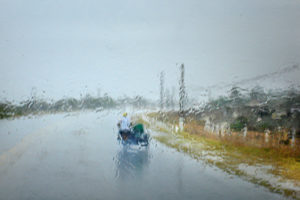Harvey, Irma Prove Humans are Hurt by Catastrophic Climate Change
My heart goes out to all those impacted by Hurricanes Harvey and Irma, the flooding in Bangladesh and other parts of Asia (not much in the US news but also very severe), or the out-of-control fires in the American West (a friend in Oregon told me, “the whole state is on fire. I can’t go out of my house because of the smoke.”
Every bit of research I’ve seen concludes that all these catastrophes are far worse than they would have been without human intervention. Humans have raised the temperatures in the Gulf of Mexico through our industry, agriculture, and architecture, and those warmer waters vastly increased the severity of the storms. And because of numerous social choices over decades if not centuries, disaster impacts tend to fall most heavily on those who can least afford it.

This pattern has been increasing dramatically since at least 2005, starting with the Asian typhoon and continuing through Katrina and Rita, Irene and Sandy, and now Harvey and Irma. Humans have built flood-vulnerable buildings in low-lying places where flooding, sooner or later, is inevitable. So not only are the storms more severe measuring just their force, but they impact the human-built landscape where that humanscape ignores nature’s principles.
To think of it another way, the planet is fighting back against the human assault. The planet doesn’t really care about humans as a species, or even individual ecosystems. The planet just wants to survive, and it acts to protect the “macro-ecosystem”: the planet as a whole. It has already survived extinctions of millions of species, including some that were the dominant lifeforms before earlier, non-human-caused catastrophic climate events. If humans are wiped out and cockroaches rule the earth, Earth won’t care.
But we care. We want a world whose treasured heritage and powerful promise we can pass on to many generations.
Please talk to your friends, colleagues, neighbors, and especially your legislators. Help them understand that human-caused catastrophic climate change is real, and that *there are things we can do to mitigate the impact and even reverse the terrible trends.*
We can take individual actions, from switching to organic foods and eating less meat to insulating our homes and workplaces and using LED lighting. And we can also take action as a society. With no help from the US federal government, individual cities and states can still participate in the Paris Accords (and many have). For bottom-line revenue-building and expense reducing reasons, companies can design buildings that create at least as much energy as they use, from clean renewable sources (and many have).
But still, government must have a role: in funding not just disaster relief but preventive measures such as dam inspections and humane ones such as fair labor practice enforcement (both stripped of much of their funding by the current administration). In encouraging clean energy. In understanding that foreign policy needs to factor in who uses what resources in which ways, and that domestic policy has to focus on creating jobs in industries that will remain relevant (unlike, for instance, coal and nuclear, neither of which are economically viable in the current world).
I could go on for much longer, but I’ll just say, thanks for listening, talk to your network, write letters to the editor, and contact your legislators.


We HAVE to start talking about Weather Control technologies and various geoengineering going on all over the world “under the radar,” — not only through military operations, but also through countless private weather control companies. For decades it’s been going on. Not to mention HAARP technologies heating ionospheres. It is unregulated and at the whim of the richest of the rich. WHY are we not talking about these precarious realities?
Another example of meddling with forces we don’t understand (let alone control). I haven’t really done the research, but I have heard that our attempts to shape weather tend to boomerang back at us as the planet figures out another (and often more destructive) way to “make itself heard.”